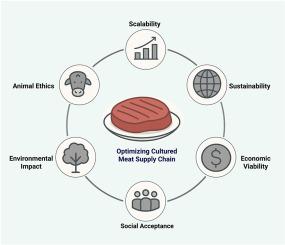Dissecting the cultured meat supply chain: A comprehensive review
IF 15.4
1区 农林科学
Q1 FOOD SCIENCE & TECHNOLOGY
引用次数: 0
Abstract
Background
The pursuit of sustainable and ethical food production has led to groundbreaking innovations such as cultured meat, a transformative solution to the environmental, ethical, and resource-related challenges of traditional meat production. Cultured meat is derived by cultivating animal cells in controlled environments, eliminating the need for conventional livestock farming. This technology offers a promising alternative to meet the growing global demand for meat while reducing the ecological footprint and animal welfare concerns.
Scope and approach
This review explores the entire supply chain of cultured meat production, covering key stages such as cell sourcing, cell culturing, scaffold development, bioreactor technology, tissue differentiation, maturation, and quality control. It emphasizes the integration of biotechnology, materials science, and engineering to ensure scalability, sustainability, and adherence to regulatory and consumer standards. The paper examines stakeholder roles and interdependencies within the supply chain to provide a holistic understanding of the cultured meat ecosystem.
Key findings and conclusions
Despite rapid technological advancements, the commercialization of cultured meat faces persistent challenges including high production costs, complex logistics, regulatory uncertainties, and issues with consumer acceptance. This review highlights these challenges while outlining opportunities for supply chain optimization. By identifying critical processes and stakeholder contributions, the paper provides strategic insights for overcoming current barriers. It concludes that addressing these issues is essential to realize the full potential of cultured meat as a scalable, ethical, and environmentally sustainable food source, supporting a transformative shift in global food systems.

剖析培养肉供应链:全面回顾
对可持续和合乎道德的食品生产的追求导致了突破性的创新,如培养肉,这是传统肉类生产中环境、道德和资源相关挑战的变革性解决方案。人造肉是通过在受控环境中培养动物细胞而获得的,消除了传统畜牧业的需要。这项技术提供了一个有前途的替代方案,以满足日益增长的全球肉类需求,同时减少生态足迹和动物福利问题。本文探讨了培养肉生产的整个供应链,涵盖了细胞来源、细胞培养、支架开发、生物反应器技术、组织分化、成熟和质量控制等关键阶段。它强调生物技术、材料科学和工程的整合,以确保可扩展性、可持续性,并遵守监管和消费者标准。本文考察了供应链中的利益相关者角色和相互依赖关系,以提供对培养肉生态系统的整体理解。尽管技术进步迅速,但人造肉的商业化仍面临着持续的挑战,包括高生产成本、复杂的物流、监管不确定性以及消费者接受度问题。本文强调了这些挑战,同时概述了供应链优化的机会。通过识别关键过程和利益相关者的贡献,本文提供了克服当前障碍的战略见解。报告的结论是,解决这些问题对于充分发挥培养肉作为一种可扩展、合乎道德和环境可持续的食物来源的潜力,支持全球食品系统的转型至关重要。
本文章由计算机程序翻译,如有差异,请以英文原文为准。
求助全文
约1分钟内获得全文
求助全文
来源期刊

Trends in Food Science & Technology
工程技术-食品科技
CiteScore
32.50
自引率
2.60%
发文量
322
审稿时长
37 days
期刊介绍:
Trends in Food Science & Technology is a prestigious international journal that specializes in peer-reviewed articles covering the latest advancements in technology, food science, and human nutrition. It serves as a bridge between specialized primary journals and general trade magazines, providing readable and scientifically rigorous reviews and commentaries on current research developments and their potential applications in the food industry.
Unlike traditional journals, Trends in Food Science & Technology does not publish original research papers. Instead, it focuses on critical and comprehensive reviews to offer valuable insights for professionals in the field. By bringing together cutting-edge research and industry applications, this journal plays a vital role in disseminating knowledge and facilitating advancements in the food science and technology sector.
 求助内容:
求助内容: 应助结果提醒方式:
应助结果提醒方式:


